Books
Books
published in 2022

Everything for Everyone: An Oral History of the New York Commune, 2052-2072
By the middle of the twenty-first century, war, famine, economic collapse, and climate catastrophe had toppled the world's governments. In the 2050s, the insurrections reached the nerve center of global capitalism—New York City. This book, a collection of interviews with the people who made the revolution, was published to mark the twentieth anniversary of the New York Commune, a radically new social order forged in the ashes of capitalist collapse.
Here is the insurrection in the words of the people who made it, a cast as diverse as the city itself. Nurses, sex workers, antifascist militants, and survivors of all stripes recall the collapse of life as they knew it and the emergence of a collective alternative. Their stories, delivered in deeply human fashion, together outline how ordinary people's efforts to survive in the face of crisis contain the seeds of a new world.

Dearth & God's Green Mirth
A new tête-bêche diptych chapbook from innovative poet Cody-Rose Clevidence, DEARTH & GOD'S GREEN MIRTH discovers dark songs unseen in distant places unheard.
Careening wildly between the philosophical angst of being a human on this planet in this certain moment in human history, and barefaced, godless whimsy, the two projects in this t'teb'che diptych chapbook discard formalisms, even their own, to investigate the relationship between the space of the whole universe and god. Protoformal, DEARTH is a collection of scifi dirges for all of living things on a small contaminated planet. In God's Green Mirth the poet playfully degrades god, for fun.
Cody-Rose Clevidence is the author of BEAST FEAST (2014) and FLUNG/THRONE (2018), both from Ahsahta Press, LISTEN MY FRIEND, THIS IS THE DREAM I DREAMED LAST NIGHT from The Song Cave and Aux Arc / Trypt Ich from Nightboat, as well as several handsome chapbooks (flowers and cream, NION, garden door press, Auric). They live in the Arkansas Ozarks with their excellently named animals.

Queer St Ives and Other Stories
This first ever queer history of St Ives weaves together biography with art and social history to shine new light on a pivotal era in the development of British modernism.
Based on original interviews and previously unpublished letters and diaries, Queer St Ives reveals a fascinating, hitherto undocumented history, adding vital new insight into the history of the fabled British art colony. At the center of this pioneering volume is the sculptor John Milne, who arrived in the southwestern town of St Ives, Cornwall, in 1952, to work as an assistant to Barbara Hepworth. Hidden behind tall granite walls, Milne's house, Trewyn, became a meeting point for queer figures from the arts and was the scene of legendary parties.
The large cast—queer and otherwise—featured here includes artists Francis Bacon, Alan Lowndes, Marlow Moss, Patrick Procktor, Mark Tobey, Keith Vaughan and Brian Wall; Whitechapel Art Gallery director Bryan Robertson; actors Keith Barron and Richard Wattis; potter Janet Leach; writers Tony Warren and Richard Blake Brown; and the extraordinary Julian Nixon, a queer everyman whose involvement in the group has been little explored until now.

Dust
Cactus erotica. Dykes taking T erotica. Handmade rope erotica.
Tangentially alien erotica. Clit long like laffy taffy erotica. Death erotica.
In L.A. Warman's anti-sequel to her award-winning debut Whore Foods, two anonymous lovers traverse the vast and lonely desert which has blighted most of the continent. In their possession is the gift of the Vapors, a mystical substance which allows them to transcend death. Yet as they explore the desert realm and each other, they cannot help but wonder if their entwined destiny resides somewhere beyond transcendence.
LA Warman is a poet, performer, and teacher currently based in New York City. Warman is the author of Whore Foods, an erotic novella which recieved a Lambda Literary Award in 2020. She is the founder of Warman School, a non-accredited and body based learning center. The Warman School has taught over 500 students online and in person. She teaches topics such as erotics, death, depression, and god. Pitchfork named her piece ADMSDP one of the top 100 songs of 2020. She has had performance and installation work in shows at MOCA Cleveland, ICA Philadelphia, Time-Based Art Festival, Poetry Project, and Open Engagement. Warman has presented performative poetics research at Brown University, Hamilton College, Reed College, Hampshire College, and others. She is a founding organizer of the Free Ashley Now survivor defense campaign.
"This book is an instant waypoint on my return to the revelation: if nothing else, my tears have a place where they belong—mixed into the dust of others." — Wilmer Wilson IV

TIME
TIME by Spencer Longo is a collection of printed work depicting government raids, religious visions, environmental catastrophe, and extremist fundamentalism tangled together in a narrative web of salvation, annihilation, and transcendence. Using pen plotter graphics directly on uncollated pages of Time magazine, Longo explores the conspiratorial trope that messages are secretly embedded in mass media, coaxing our millenarian anxieties out through an additive printing process using graphics from survivalist publications, end-times evangelical cartoons, and marginalia from the borders of underground occult material, all sprinkled with ecstatic bursts of star-spangled clipart. A must-have for your fallout shelter's library.

Desiderata
Desiderata is a collection of Lizzy Mercier Descloux's poetry, photos, and diaristic fragments from her visit to New York City in the winter of 1977. Only eighteen at the time, Descloux fell into the orbits of the nascent No Wave scene festering in Lower Manhattan, where she befriended Richard Hell, Patti Smith, and ZE Records founder Michel Esteban. Desideratacharts the musician's early ambitions as a writer, revealing a potent poetic voice that careens from acid-tinged social observations to outright Dadaist semantic revelry, interspersed with collages and hand-written notes. Originally composed entirely in French, this is the first time these works have ever appeared in English and this edition includes the original French facsimile bound tête-bêche with the new English translation.
Martine-Elisabeth "Lizzy" Mercier Descloux (16 December 1956 – 20 April 2004) was a French musician, singer-songwriter, composer, actress, writer and painter. She collaborated with a wide range of musicians including Wally Badarou and Chet Baker.
Emma Ramadan was initiated into the mystery of Bastet at the age of thirteen and rose to the station of High Scioness. After leaving the temple she hopped freight across the Maghreb, where she began translating esoterica carved into the boxcar walls. She has independently discovered numerous uncatalogued cave systems and varietals of nightshade tea. Her name appears on the underside of stones and in various magazines whose pages seem to turn on their own.
Translated by Emma Ramadan.
Bilingual edition: FR/ENG
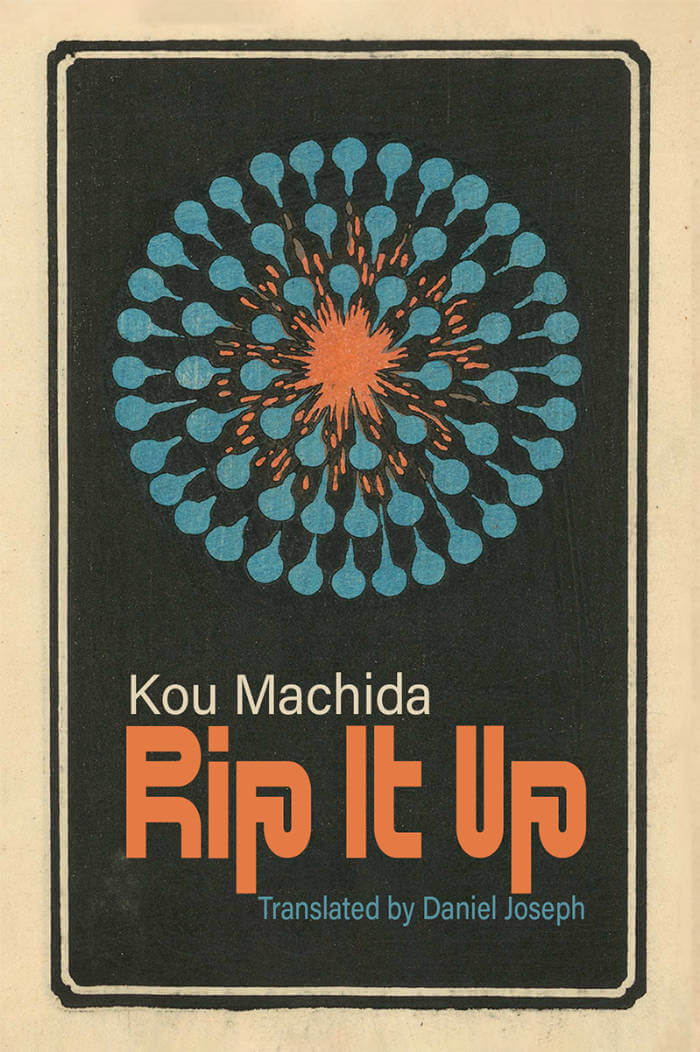
Rip It Up
Rip It Up is the first ever English translation of Kou Machida's award-winning novel, an undertaking over five years in the making and the inaugural title of Inpatient Press's new translation imprint Mercurial Editions.
Set in a kaleidoscopic hyperreal Japan circa Y2K, Rip It Up catalogues the misdeeds and misgivings of a down-and-out wannabe debonair who ekes out a meager living at the fringes of the art world, wracked by jealousy at his friend's success and despondency of his own creative (and moral) bankruptcy. In turn hilarious and also horrifying, Machida's pyrotechnic prose plumbs the discursive depths of the creative spirit, a head-spinning survey of degeneration and self-sabotage.
Kou Machida is a punk singer, actor, and author, who turned to poetry and fiction after releasing one of the seminal Japanese punk albums with his band INU, 1981’s Meshi kuuna! (Fuck Eating!). He has won the Akutagawa and Tanizaki prizes among many others, and his 2005 novel Kokuhaku (Confession) was named one of the three best books of the last thirty years by the Asahi Newspaper.
Daniel Joseph is a translator, editor, and musician who spent his salad days shouting in dank basements before getting a master’s degree in medieval Japanese literature. Recent translation projects include contributions to Terminal Boredom (Verso, 2021), a collection of stories by science fiction pioneer Izumi Suzuki; and the memoir Try Saying You’re Alive! (Blank Forms, 2021) by outsider folk maniac Kazuki Tomokawa.
Winner of the 2000 Akutagawa Prize for Fiction
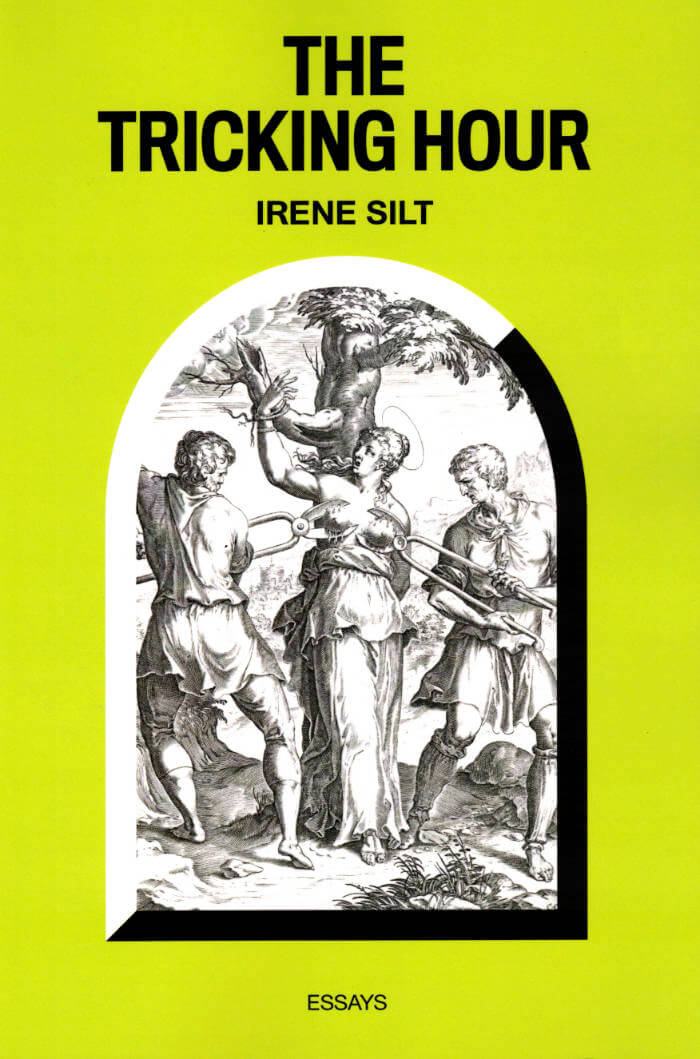
The Tricking Hour
Part anti-work polemic, part sex worker's confession, the luminous essays in The Tricking Hour envision a world organized around collective autonomy, survival, and care, instead of the compulsory exploitation of the body.
Irene Silt writes about power, anti-work feeling, joy, and deviance. Their essays and poems have been published in Mask Magazine, ANTIGRAVITY, Spoil, LESTE, Trou Noir, Poiesis Journal and in the Tripwire pamphlet series. They live in New York.
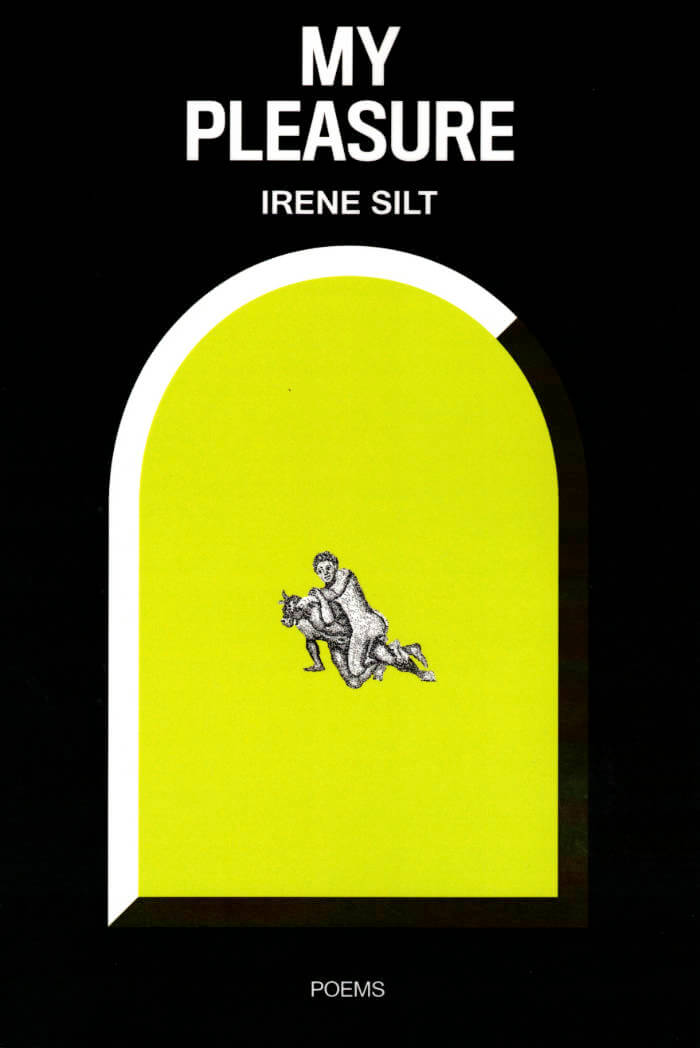
My Pleasure
My Pleasure lives in the poetic entanglements of pleasure, disgust, and agency. Silt asks: Where do we extract pleasure, and what pleasure do we find in extraction?
Irene Silt writes about power, anti-work feeling, joy, and deviance. Their essays and poems have been published in Mask Magazine, ANTIGRAVITY, Spoil, LESTE, Trou Noir, Poiesis Journal and in the Tripwire pamphlet series. They live in New York.

Ventoline #4 – mai 2022
Ventoline est un fanzine né à la fois d’un enthousiasme quotidien pour ce qui se rapporte à la musique, et d’une véritable lassitude face à la quasi-absence de paroles féminines autour de ce vaste sujet. Commenter, critiquer, prescrire, partager ses histoires, ses goûts, ses dégoûts, en somme, sa culture musicale… Pourquoi si peu de femmes s’autorisent à le faire? Même lorsqu’elles programment, organisent, sonorisent des concerts, lorsqu’elles mixent tous les week-ends, pogotent au premier rang, lorsqu’elles sortent des disques, dessinent des affiches et récurent les tréfonds de Soulseek. Même lorsqu’elles produisent et consomment de la musique.
Le but de ce fanzine ne sera ni d’émettre des classements, ni de théoriser savamment afin d’être prises au sérieux. La musique nous a construites personnellement et socialement, il s’agira donc de partager nos expériences liées à elle —heureuses comme foireuses—, nos observations, nos fantasmes, nos figures tutélaires. Ce que ça fait, entre autres, de tourner pendant un mois dans un van, de passer pour la potiche de service ou de se prendre une claque au détour d’une compile. De Portland à Barcelone, en passant par Paris, Marseille, Bruxelles, Lyon et Leipzig, une douzaine de mélomanes polymorphes ont prêté leur voix à ce premier numéro de Ventoline.
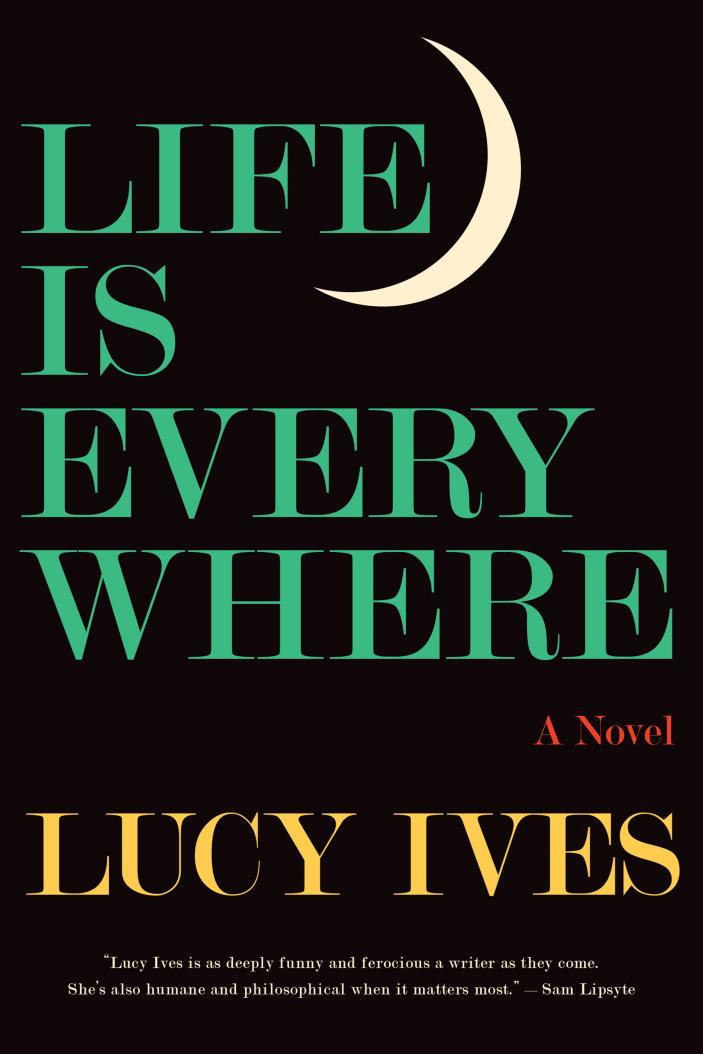
Life Is Everywhere
Everything that happened was repetition. But it was repetition with a difference. So she dragged along in a spiral, trusting to this form.
Manhattan, 2014. It’s an unseasonably warm Thursday in November and Erin Adamo is locked out of her apartment. Her husband has just left her and meanwhile her keys are in her coat, which she abandoned at her parents’ apartment when she exited mid-dinner after her father—once again—lost control.
Erin takes refuge in the library of the university where she is a grad student. Her bag contains two manuscripts she’s written, along with a monograph by a faculty member who’s recently become embroiled in a bizarre scandal. Erin isn’t sure what she’s doing, but a small, mostly unconscious part of her knows: within these documents is a key she’s needed all along.
With unflinching precision, Life Is Everywhere captures emotional events that hover fitfully at the borders of visibility and intelligibility, showing how the past lives on, often secretly and at the expense of the present. It’s about one person on one evening, reckoning with heartbreak—a story that, to be fully told, unexpectedly requires many others, from the history of botulism to an enigmatic surrealist prank. Multifarious, mischievous, and deeply humane, Lucy Ives’s latest masterpiece rejoices in what a novel, and a self, can carry.
[note from the publisher]

And then it got legs: Notes on dance dramaturgy
Drawing on his experience in the field of contemporary dance, Jeroen Peeters discusses principles, methods and practices that contribute to an understanding of dramaturgy as an experimental, collaborative practice and a material form of thinking.
Written from practice, this book reflects a particular history of collaboration and conversation with dance-makers such as Martin Nachbar, Meg Stuart, Vera Mantero, Sabina Holzer, Lisa Nelson, Jennifer Lacey, Chrysa Parkinson, deufert + plischke, Eleanor Bauer, Philipp Gehmacher and many others.
Phantasmal archaeology, unfolding material, literal and physical reading, crafting method, articulating process, witnessing and performing not-knowing, naming and ritual destruction, conceptual landscapes, symbolic waste, internal fictions and foreign objects – they may all play a role in creation and in exploring the unfamiliar in pursuit of making sense.
And then it got legs is an invitation to think along or against, to discuss those ideas with others or explore them in the studio, and eventually to imagine and devise one’s own methods of research, observation, reflection and creation.

Press & Fold — Notes on making and doing fashion
This Press & Fold issue on Resistance presents conversations, propositions and imaginations of fashion and resistance outside of fashion’s industrial context. For protest and resistance to become effective, it depends on community to generate, support and further it: with this issue we think further on these ideas of protest, activism and resistance in and around fashion, and not only in terms of clothing, and how it is portrayed in (fashion) imagery, but also in terms of how fashion is structured and organized: is fashion only able to thrive within a capitalist structure, or are there other possibilities as well? What ideas, initiatives and structures can be developed for fashion to become inclusive and generous to all participants? What needs to be resisted and what needs to be embraced? In that sense this issue of Press & Fold, as well as the previous issues, is a world-building exercise, and wants to show what we can do without, and what we need to move fashion towards becoming a generous to all participants involved?
— Note from the publisher

Love Me Tender
A novel of lesbian identity and motherhood, and the societal pressures that place them in opposition.
The daughter of an illustrious French family whose members include a former Prime Minister, a model, and a journalist, Constance Debré abandoned her marriage and legal career in 2015 to write full-time and begin a relationship with a woman. Her transformation from affluent career woman to broke single lesbian was chronicled in her 2018 novel Play boy, praised by Virginie Despentes for its writing that is at once "flippant and consumed by anxiety."
In Love Me Tender, Debré goes on to further describe the consequences of that life-changing decision. Her husband, Laurent, seeks to permanently separate her from their eight-year old child. Vilified in divorce court by her ex, she loses custody of her son and is allowed to see him only once every two weeks for a supervised hour. Deprived of her child, Debré gives up her two-bedroom apartment and bounces between borrowed apartments, hotel rooms, and a studio the size of a cell. She involves herself in brief affairs with numerous women who vary in age, body type, language, and lifestyle. But the closer she gets to them, the more distant she feels. Apart from cigarettes and sex, her life is completely ascetic: a regime of intense reading and writing, interrupted only by sleep and athletic swimming. She shuns any place where she might observe children, avoiding playgrounds and parks "as if they were cluster bombs ready to explode, riddling her body with pieces of shrapnel."
Writing graphically about sex, rupture, longing, and despair in the first person, Debré's work is often compared with the punk-era writings of Guillaume Dustan and Herve Guibert, whose work she has championed. As she says of Guibert: "I love him because he says I and he's a pornographer. That seems to be essential when you write. Otherwise you don't say anything." But in Love Me Tender, Debré speaks courageously of love in its many forms, reframing what it means to be a mother beyond conventional expectations.

Suckcess Magazine 1 — Winter 2021-22
Drama, careers, sabotage, compromises... The first issue of Suckcess Magazine begins with a selection of poems by the flamboyant Rene Ricard, edited with the help of Editions Lutanie, and continues with contributions from Miriam Laura Leonardi, Fabienne Audéoud, Camille Aleña, Gabi Losoncy, David Lieske, Sylvie Fanchon, Won Jin Choi, Estelle Hoy, and Bunny Rogers. Cartoons and tennis players are also on the program.

She didn't say it was her phone, she said her girlfriend heard a phone ringing
The volume is an epistolary narrative produced via text message with a community of anonymous correspondents. Following on from a performative work, conceived by Simon Asencio, this book stages a relation between two protagonists, U and I. Through identitarian slips and glyphs, the book explores the narrative ambiguities of experimental writing, to generate a space for fluidity and uncertainty, at the intersection of the artistic and the literary.
Edited by Lilou Vidal
Dear reader,
These words are the premises of a correspondence between you and I. It will carry on for some a few days or a few months, it's up to you-just tell me if you want ti bring this to an end. One part of this story has ended on April 19th, 2020. Another part continues within these bound pages.
U and I don't jnow each other: two letters standing in for two characters in a story yet to be narreted.
You will remain forever the riddle, an address to the unknown: I will be writing to U, unknowing of who stands behind this U (after all you could be so many), unknowing of where you stand when reading these words, unknowing of how these words might coalesce with the life that forges your sense of self daily.
In my case this I might not necessarily stand for one self either, yet I will account for all of these selves.
I hope this masquerade will allow us to get closer. To long for and attend to each other without assuming our otherness.
I do not expect any answers. Yet if you do, I promise it will remain between U and I.
I look forward x
+32 485 837 930
Simon Asencio (Toulouse, 1988) uses imposture and the expression of doubt to create performances that question the notions of liveness, stage and audience. The publication of this book results from the exhibition This Is My Body, My Body Is Your Body, My Body Is the Body of the Word, curated by Lilou Vidal, at Le Delta, Namur (BE); in partnership with Le Delta, Namur, with the support of Fédération Wallonie-Bruxelles.

From Scratch – Albanian Summer Picaresque
Dave Smith, Jan Steele and 1 more
An account of an album about Albania by British experimental musicians made in the eighties. Also involving stories about the Albanian Society, William Bland, A. L. lloyd, RCPB ML, and Cornelius Cardew.
From Scratch is a story of Albanian Summer: An Entertainment, an LP album released by Practical Music in London in 1984. The album was composed by Dave Smith—English experimental composer and musician, figure of the British minimalist scene, explorer of Javanese and Albanian musical traditions with the English Gamelan Orchestra and Liria which he co-founded, and a member of The Scratch Orchestra (with Brian Eno, Cornelius Cardew, John Tilbury, Keith Rowe, Michael Nyman, Michael Parsons, etc.)—, and performed by Janet Sherbourne and Jan Steele, improvised and classical musicians.
Through interviews, archival materials, and hard-to-find essays the publication contextualizes the background of British experimental musicians' interest in socialist Albania. It includes new interviews with Dave Smith and Jan Steele, three essays by Smith on Albanian music and culture, an essay by Gavin Bryars on Smith's music, discussions on the influence of A.L. Lloyd and Cornelius Cardew, and the role of the Albanian Society in the UK. The book introduces new insight into the leftist internationalist background of British experimental music influenced by the work of Cardew.
Apart from the musical internationalism, the book also includes a section of nine abstract slogans depicting the political and artistic contradictions of socialist Albania; annotated bibliography of books published in different languages on Albania; the collection of images taken from the biweekly Zëri i Rinisë (The Voice of Youth) published in 1984 and 1985.

Fieldguides for a Preternaturalist 3
‘Fieldguides for a Preternaturalist’ is a series of small chapbooks designed to bring collaborators, audiences, and readers together as part of the project ‘Nothing of Importance Occurred: Recuperating a Herball for a 17th-Century Enslaved Angolan Midwife at the Cape’, initiated by South African artist Wendy Morris. Through speculative investigations of plants-as-archive and storytelling-as-method, the project focuses on retrieving a library of botanical-medicinal knowledge that perhaps informed Morris’s enslaved ancestor. The ‘Fieldguides’ invite collaborators to shed light on this from multiple angles. Joshua Cohen and Johanna Lot are the guest contributors of the third edition.

Klosterruinenzines
Anna M. Szaflarski, Christopher Weickenmeier
Four zines, documenting and continuing a series of four exhibitions that took place last summer, also known as the summer of 2021 at Klosterruine Berlin. Digging up what’s always already left behind, this series reframes the exhibition as an excavation site and engages archeology as a speculative and aesthetic procedure. A map, a notebook, a calendar and a dream diary, these four zines allow you to become your own archeologist.
Texts: Simone Fattal, Bassem Saad, Anna M. Szaflarski, Christopher Weickenmeier
Designer: Studio Manuel Raeder
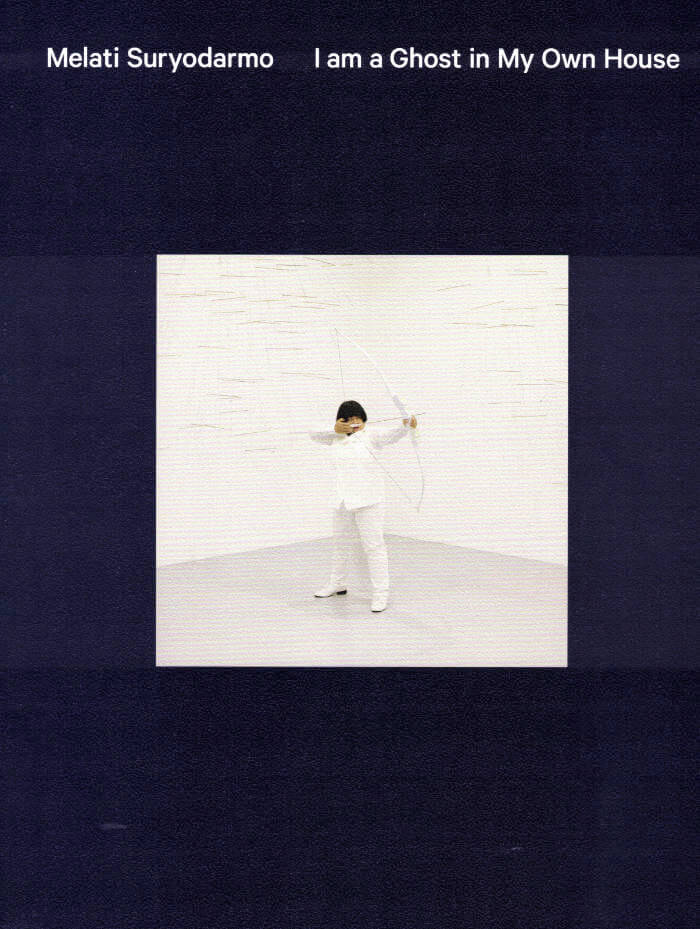
I am a Ghost in My Own House
First monograph on the durational performance artist Melati Suryodarmo, one of the pioneers of performance art in Indonesia.
Published on the occasion of the presentation of the Bonnefanten Award for Contemporary Art, BACA 2022, to Melati Suryodarmo, and in conjunction with her solo exhibition at the Bonnefanten Maastricht in 2022.
Melati Suryodarmo (born 1969 in Surakarta, Indonesia) is a versatile artist, but is particularly known for her compelling performances. Suryodarmo's performances reflect her own ideas and cultural background, and concern the relationship between the human body, the defining cultural traditions to which the body belongs and the context in which it lives. She focuses on concepts like home, spirituality, family and personal history, interweaving them with socio-political, activist and mainly feminist ideas.

Shell Reader
Literally crumbling under our own weight, several metric tonnes of shells speak up from the ground, causing a sensation remote from that of walking on a gallery floor. Yet, crushed calcite from marine molluscs is an essential ingredient in concrete, a major constituent of our built environment. In Muscle Memory, a sculpture by Nina Canell, the biomineral forms that feed the construction industry gradually break down over the course of the exhibition. Material stress gives way to a sounding, durational sculpture, inviting us to consider the ineffable number of broken bodies that holds us up. Shell Reader calls on the material vitality of calcium carbonate, detailing broken pieces of shell from Muscle Memory. By foregrounding these fragments, each page echoes a crack, snap, split, or splinter.

The Artist Job Description, for the Employment of the Artist, as an Artist, Inside the Art Institution
“The artist’s experience of being inside art institutions, starting from the effort made to be accepted in order to develop one’s art practice, then the experience of going through them, and while in them, the many ways of having to learn how to be inside. This will in several ways inform the development of an artist’s practice, for the good or for the bad. Making this publication has been an attempt at recognizing and dealing with, rather than avoiding, the tensions that exist in the relationship between artists and art institutions at a time when most art institutions themselves are under the pressure of austerity-politics.”
The Artist Job Description, for the Employment of the Artist, as an Artist, Inside the Art Institutionconstitutes the result of Vijai Maia Patchineelam’s PhD research in the arts at the Royal Academy of Fine Arts Antwerp, University of Antwerp and a.pass, advance performance and scenography studies, Brussels.
Authors for the research seminar ‘Descriptions Change, The Artist Job Description: ADRIJANA GVOZDENOVIĆ, EVI OLDE RIKKERT, FELIX RAPP, JOEP VOSSEBELD, JULIA DAHEE HONG AND PIA LOUWERENS
Copy-editor for ‘The Artist Job Description, For the Employment of the Artist, as an Artist, Inside the Art Institution’: HEMANT SAREEN
Co-Editor for thickets: FABIEN SILVESTRE SUZOR
Proof-reader: SARAH PREDDY
Graphic design: NINA BAČUN AND ROBERTA BRATOVIĆ (OAZA, ZAGREB)
Printer: SVEUČILIŠNA TISKARA, ZAGREB
Edition: 400

Taming a Wild Tongue
Laura Cemin, Bianca Hisse and 1 more
Referring to Gloria Anzaldúa's notion of 'wild tongue' (Borderlands/ La Frontera, 1987), the publication departs from the questions: How to tame a wild tongue? How to carry language? The verbs 'taming' and 'carrying' imply certain dynamics of permission and restriction of movement, and suggest the entanglement between language and the body. The project delves into the notion of 'tonuge' as an archive: the 'tongue' as a muscle shaped by the physical practice of moving/ talking, having memory; the 'tongue' as a 'cultured' part of the body. It addresses accent as part of our linguistic identity, but also something that defines access or restriction. (From Monika Charkowska's preface to the publication)
Artists: Bianca Hisse, Laura Cemin
Curated by: Monika Charkowska
Texts by: Monika Charkowska, Claire Goodall, Kübra Gümüsay, Bianca Hisse, Laura Cemin
Edited by: Monika Charkowska
Translations: Epp Aareleid (ENG to EST), Ksenia Krimer (ENG to RUS), Keiu Krikmann (ENG to EST), Anita Kodanik (ENG to RUS)
English Proof-Reading: Epp Aareleid
Graphic Design: Kersti Heile
Edition of 200.

Kamer I - Oesters
‘Kamer I - Oesters’ is een kort verhaal geschreven in het kader van het kunstproject Beste Anna,. Hierin fungeert de figuur van de openlijk lesbische Rotterdamse schrijfster Anna Blaman als motor voor vragen, gesprekken en correspondenties rondom feminisme, schrijvende vrouwen en de canon, anders zijn, eenzaamheid en vriendschap.
Ook verkent Katinka met dit onderzoek Anna Blaman als personage voor een toekomstige roman. In ‘Kamer I - Oesters’ betreedt de hoofdpersoon Anna’s met een rolkoffer vol boeken van andere schrijvers, fluistert ze hun woorden in de kieren in Anna’s muren en verleidt ze Anna met een pauwendans.
Anna Blaman (1905-1960) was openlijk lesbisch, in die tijd een groot taboe, maar zag zichzelf niet als voorvechter van een beweging. Een belangrijk thema in haar werk is de vraag of we een ander werkelijk kunnen kennen. De personages in haar romans zijn vaak alleen en verlangen naar een ander, die altijd onbereikbaar blijft. In 1948 publiceerde Blaman de roman Eenzaam Avontuur, die erg veel stof op deed waaien vanwege enkele (homo-)erotische personages die in het boek voorkomen.